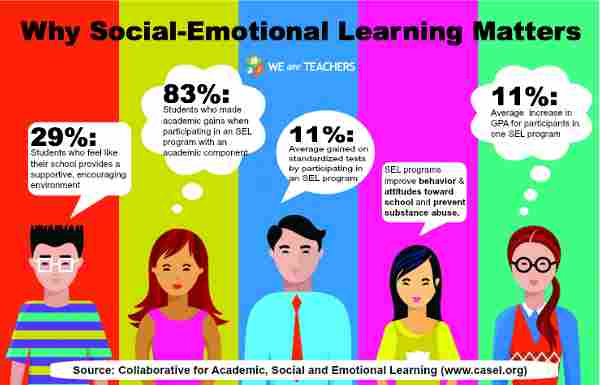In our ever-evolving world, we continue to grapple with various challenges—be it climate change, political upheaval, or new technological advancements—that leave an indelible mark on human lives. While academic and technical skills remain essential, social-emotional learning (SEL) has never been more critical. In this article, we explore why social-emotional learning matters and how it contributes to the comprehensive development of an individual.
Social-emotional learning is a process through which individuals acquire the necessary skills to understand and manage their emotions, show empathy, develop and maintain healthy relationships, make responsible decisions, and achieve various goals. SEL instills five core competencies in an individual: self-awareness, self-management, social awareness, relationship skills, and responsible decision-making.
Why is Social-Emotional Learning Important?
1. Mental Health: SEL enhances mental health by providing individuals with the ability to understand their emotions and manage stress more effectively. Programs focused on SEL help reduce the risk of anxiety, depression, and other mental health concerns.
2. Academic Success: Studies have shown that students who participate in SEL programs perform significantly better academically than their peers who do not. Developing emotional intelligence leads to increased focus in classrooms, improved critical thinking skills, and stronger problem-solving abilities.
3. Improved Relationships: By emphasizing empathy and effective communication techniques, SEL cultivates stronger relationships with both colleagues and loved ones. Individuals equipped with these skills are less likely to experience conflicts in their personal or professional lives.
4. Responsible Decision-Making: SEL helps people make better decisions by fostering accountability for one’s actions and promoting a thorough understanding of potential consequences regarding others’ feelings or well-being.
5. Career Development: Employers often value professionals who possess strong emotional intelligence and communication skills—the foundations of SEL. By honing these abilities in employees, organizations bolster teamwork, leadership potential, and company culture.
6. Community Building: A community strengthened by SEL promotes inclusivity, tolerance, and understanding. These qualities are integral to overcoming prejudice and fostering social cohesion.
SEL Implementation
Schools, workplaces, and communities must strive to incorporate SEL into their everyday practices. In educational settings, this can be achieved by integrating age-appropriate activities that teach essential emotional, cognitive, and interpersonal skills.
Similarly, organizations can promote workplace well-being by developing specific programs that enable employees to practice emotional intelligence and facilitate a supportive work environment. This fosters better decision-making and collaboration, allowing the company to thrive in an increasingly competitive market.
In conclusion, social-emotional learning plays a crucial role in promoting mental health, academic success, personal growth, and community development. By prioritizing SEL initiatives across all levels of society, we prepare current and future generations for the challenges this complex world presents.

